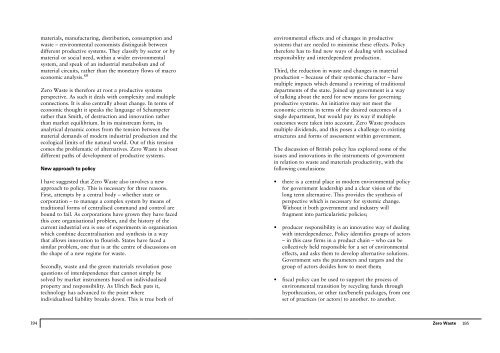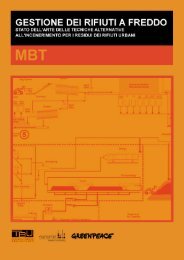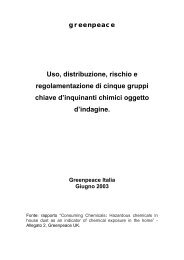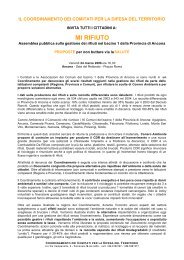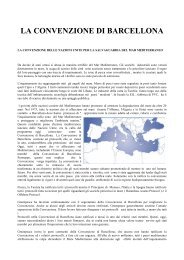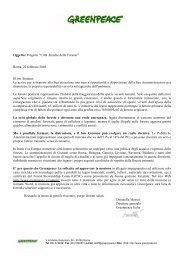Zero Waste by Robin Murray, Greenpeace Environmental Trust 2002
Zero Waste by Robin Murray, Greenpeace Environmental Trust 2002
Zero Waste by Robin Murray, Greenpeace Environmental Trust 2002
Create successful ePaper yourself
Turn your PDF publications into a flip-book with our unique Google optimized e-Paper software.
materials, manufacturing, distribution, consumption and<br />
waste – environmental economists distinguish between<br />
different productive systems. They classify <strong>by</strong> sector or <strong>by</strong><br />
material or social need, within a wider environmental<br />
system, and speak of an industrial metabolism and of<br />
material circuits, rather than the monetary flows of macro<br />
economic analysis. 127<br />
<strong>Zero</strong> <strong>Waste</strong> is therefore at root a productive systems<br />
perspective. As such it deals with complexity and multiple<br />
connections. It is also centrally about change. In terms of<br />
economic thought it speaks the language of Schumpeter<br />
rather than Smith, of destruction and innovation rather<br />
than market equilibrium. In its mainstream form, its<br />
analytical dynamic comes from the tension between the<br />
material demands of modern industrial production and the<br />
ecological limits of the natural world. Out of this tension<br />
comes the problematic of alternatives. <strong>Zero</strong> <strong>Waste</strong> is about<br />
different paths of development of productive systems.<br />
New approach to policy<br />
I have suggested that <strong>Zero</strong> <strong>Waste</strong> also involves a new<br />
approach to policy. This is necessary for three reasons.<br />
First, attempts <strong>by</strong> a central body – whether state or<br />
corporation – to manage a complex system <strong>by</strong> means of<br />
traditional forms of centralised command and control are<br />
bound to fail. As corporations have grown they have faced<br />
this core organisational problem, and the history of the<br />
current industrial era is one of experiments in organisation<br />
which combine decentralisation and synthesis in a way<br />
that allows innovation to flourish. States have faced a<br />
similar problem, one that is at the centre of discussions on<br />
the shape of a new regime for waste.<br />
S e c o n d l y, waste and the green materials revolution pose<br />
questions of interdependence that cannot simply be<br />
solved <strong>by</strong> market instruments based on individualised<br />
p ro p e rty and re s p o n s i b i l i t y. As Ulrich Beck puts it,<br />
technology has advanced to the point where<br />
individualised liability breaks down. This is true both of<br />
e n v i ronmental effects and of changes in pro d u c t i v e<br />
systems that are needed to minimise these effects. Policy<br />
t h e re f o re has to find new ways of dealing with socialised<br />
responsibility and interdependent pro d u c t i o n .<br />
Third, the reduction in waste and changes in material<br />
production – because of their systemic character – have<br />
multiple impacts which demand a rewiring of traditional<br />
departments of the state. Joined up government is a way<br />
of talking about the need for new means for governing<br />
productive systems. An initiative may not meet the<br />
economic criteria in terms of the desired outcomes of a<br />
single department, but would pay its way if multiple<br />
outcomes were taken into account. <strong>Zero</strong> <strong>Waste</strong> produces<br />
multiple dividends, and this poses a challenge to existing<br />
structures and forms of assessment within government.<br />
The discussion of British policy has explored some of the<br />
issues and innovations in the instruments of government<br />
in relation to waste and materials productivity, with the<br />
following conclusions:<br />
• there is a central place in modern environmental policy<br />
for government leadership and a clear vision of the<br />
long term alternative. This provides the synthesis of<br />
perspective which is necessary for systemic change.<br />
Without it both government and industry will<br />
fragment into particularistic policies;<br />
• producer responsibility is an innovative way of dealing<br />
with interdependence. Policy identifies groups of actors<br />
– in this case firms in a product chain – who can be<br />
collectively held responsible for a set of environmental<br />
effects, and asks them to develop alternative solutions.<br />
Government sets the parameters and targets and the<br />
group of actors decides how to meet them;<br />
• fiscal policy can be used to support the process of<br />
environmental transition <strong>by</strong> recycling funds through<br />
hypothecation, or other tax/benefit packages, from one<br />
set of practices (or actors) to another. to another.<br />
194<br />
<strong>Zero</strong> <strong>Waste</strong> 195


